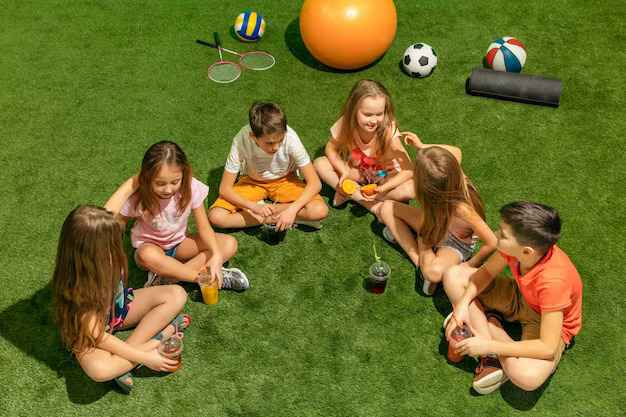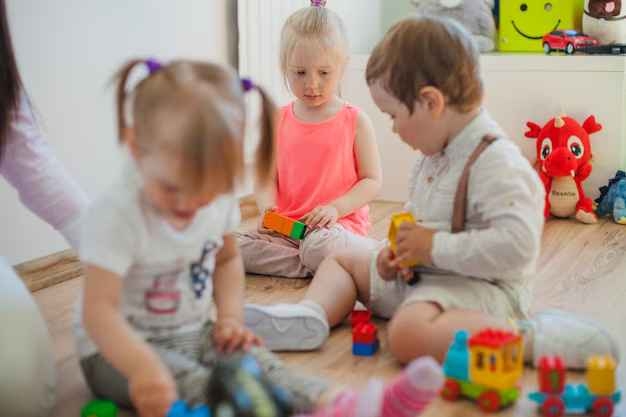Preschool is a time of exploration, learning, and building connections. One essential aspect of this early education experience is encouraging peer interaction. Creating a positive environment where children feel comfortable interacting with their peers lays the foundation for social skills, empathy, and a sense of community. In this article, we will explore simple and effective ways to encourage peer interaction in preschool, fostering a supportive and collaborative atmosphere.
Structured Play Activities
Structured play activities provide an excellent opportunity for preschoolers to engage with their peers. Incorporating games that encourage turn-taking, sharing, and collaboration promotes positive interaction. Teachers can organize activities such as group games, puzzles, or arts and crafts projects that require teamwork, providing a platform for children to interact and learn together.
Cooperative Learning Centers
Setting up cooperative learning centers within the preschool environment allows children to engage in shared activities. These centers can include building blocks, reading corners, or dramatic play areas. Designating spaces where children can collaborate on projects or engage in imaginative play fosters a sense of community and encourages peer interaction.
Circle Time Discussions
Circle time is a valuable opportunity for group discussions. Teachers can initiate conversations about daily experiences, feelings, or topics related to classroom themes. Encouraging children to share their thoughts and listen to their peers builds communication skills and creates a supportive atmosphere where friendships can blossom.
Buddy Systems
Implementing a buddy system pairs children together, promoting a sense of companionship and cooperation. Older preschoolers can be paired with younger ones, creating mentorship opportunities and fostering a supportive environment. This system encourages responsibility and empathy as children learn to navigate social interactions together.
Inclusive Group Activities
Organizing inclusive group activities ensures that every child has a chance to participate. Games like "musical chairs" or collaborative art projects allow children of varying abilities to join in the fun. Inclusivity in activities helps build a sense of belonging and encourages positive peer relationships.
Celebrating Differences
Preschool is a diverse environment, and celebrating differences is crucial in fostering a positive peer interaction culture. Teachers can introduce activities that explore various cultures, traditions, and family structures, encouraging children to appreciate and respect each other's uniqueness. This promotes a sense of inclusivity and understanding among peers.

Teacher Facilitation and Modeling
Teachers play a pivotal role in encouraging peer interaction. By actively participating in activities, modeling positive behavior, and providing guidance when conflicts arise, teachers create a supportive atmosphere. Their facilitation ensures that peer interactions are guided by kindness, cooperation, and respect.
Related : The Benefits of Early Childhood Education: Why Preschool Matters
Choosing the Right Preschool for Positive Peer Interaction
Choosing the right preschool is a crucial decision that significantly impacts a child's early social development. The preschool environment plays a pivotal role in shaping positive peer interactions by providing the foundation for social skills, communication, and cooperation. An ideal preschool fosters an atmosphere where children feel emotionally secure, encouraged, and supported in their interactions with peers. A well-selected preschool, such as Montessori Shir Hashirim, recognizes the importance of social development and incorporates activities that promote collaboration and inclusivity.
Montessori Shir-Hashirim Los Angeles
- 6047 Carlton Way, Los Angeles, CA 90028
- Highly rated for focused curriculum, excellent staff, and diverse extracurriculars
- Half day: $27,000 yearly, $9,000 quarterly
- Full day: $28,500 yearly, $9,500 quarterly
Shir-Hasirim Montessori school has two different locations. The main location is on Carlton Way in Los Angeles. This school teaches children between the ages of 2 and 6 and prepares them for some of the top Montessori elementary schools in the city. Specifically, they offer a primary program and a summer program for preschool children.
At Shir-Hashirim, they allow their students to grow and learn both individually and within the community of the school. Students are able to learn at their own pace when it comes to both practical life skills and subjects such as maths and language. Shir-Hashirim Montessori has a parent-and-me program that is best for families who may enrol their child in the Montessori program.
Conclusion
Encouraging peer interaction in preschool is not just about play; it's about building the social foundation for a child's future. By implementing these simple strategies, teachers and parents can contribute to the development of essential social skills. Positive peer interactions in preschool create an environment where children feel valued, understood, and ready to navigate the world together.


